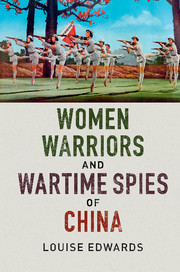Book contents
- Frontmatter
- Dedication
- Contents
- List of Figures
- Acknowledgements
- Chronology
- 1 Soldiering, war and gender in China
- 2 The archetypal woman warrior, Hua Mulan: Militarising filial piety
- 3 Qiu Jin: Transitioning from traditional swordswoman to feminist warrior
- 4 Xie Bingying opening public spaces to women Fighting patriarchy and fighting militarists
- 5 Aisin Gioro Xianyu: ‘Joan of Arc of the Orient’ or ‘Mata Hari of the East’?
- 6 Guerrilla resistance leader, Zhao Yiman: Warrior teacher and self-sacrificing CCP mother
- 7 Negotiating sexual virtue: The glamorous, honey-trap spy, Zheng Pingru
- 8 Ding Ling and Zhenzhen: Female chastity and good communist governance
- 9 Mobilising and militarising rural China through the girl martyr, Liu Hulan
- 10 Women warriors and wartime spies as tools for ‘total militarisation’: The Red Detachment of Women
- Notes
- Bibliography
- Index
6 - Guerrilla resistance leader, Zhao Yiman: Warrior teacher and self-sacrificing CCP mother
Published online by Cambridge University Press: 05 March 2016
- Frontmatter
- Dedication
- Contents
- List of Figures
- Acknowledgements
- Chronology
- 1 Soldiering, war and gender in China
- 2 The archetypal woman warrior, Hua Mulan: Militarising filial piety
- 3 Qiu Jin: Transitioning from traditional swordswoman to feminist warrior
- 4 Xie Bingying opening public spaces to women Fighting patriarchy and fighting militarists
- 5 Aisin Gioro Xianyu: ‘Joan of Arc of the Orient’ or ‘Mata Hari of the East’?
- 6 Guerrilla resistance leader, Zhao Yiman: Warrior teacher and self-sacrificing CCP mother
- 7 Negotiating sexual virtue: The glamorous, honey-trap spy, Zheng Pingru
- 8 Ding Ling and Zhenzhen: Female chastity and good communist governance
- 9 Mobilising and militarising rural China through the girl martyr, Liu Hulan
- 10 Women warriors and wartime spies as tools for ‘total militarisation’: The Red Detachment of Women
- Notes
- Bibliography
- Index
Summary
In 1948, in anticipation of their victory in the civil war, the communist authorities controlling Harbin City opened a memorial hall called ‘The North East Martyrs’ Museum’ to mark those who had died in the struggle against the Japanese and the Nationalists. The woman guerrilla fighter, Zhao Yiman (1905–1936), occupied a significant part of the exhibition space – lodged, as it was, in the very same premises in which she had been tortured during interrogation by the occupying Japanese twelve years earlier. The major thoroughfare leading to the museum is called ‘Yiman Road’ in her honour. In 1960 a museum also dedicated to her opened in her hometown, Yibin, in the western province of Sichuan and in 1996 a further commemorative building dedicated to her memory was opened in Shangzhi City – the location of key events in her heroic life and early death. The Chinese Communist Party (CCP) has built and sustained stories of Zhao for decades, consolidating her status as the premier communist woman warrior martyr right to the present.
During her lifetime, few people knew her name. Unlike the infamous Aisin Gioro Xianyu discussed in the preceding chapter, against whose Manchukuo state Zhao's forces waged their guerrilla battles, Zhao Yiman only became known years after her death when the People's Republic of China (PRC) commenced its memorialisation of wartime heroes. The PRC propaganda system adopts a ‘total propaganda’ approach – all ages, classes and localities are targeted with carefully constructed, subtly evolving messages using diverse media and formats. As well as the museums and memorial halls, she is the subject of two full-length feature films, multiple serialised comics, poems, paintings, textbooks, websites and biographies. The great wall of narrative surrounding figures like Zhao Yiman recreates war ‘memories’ as emotionally charged pedagogical experiences of political and moral self-improvement.
Her status as a guerrilla mother is central to her efficacy in the total propaganda system because it enables the CCP to prompt people's emotional responses around their fears of the integrity of their family units. The CCP positions itself within the propaganda narrative as a supra-parent caring for the national family.
- Type
- Chapter
- Information
- Women Warriors and Wartime Spies of China , pp. 117 - 136Publisher: Cambridge University PressPrint publication year: 2016



